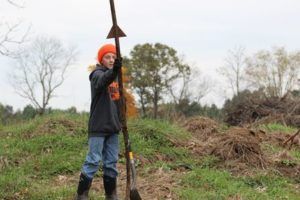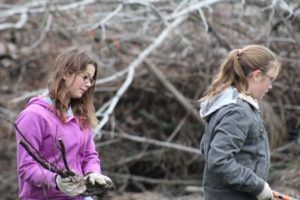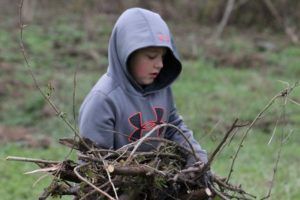MUCC’s OTG Jr. Awarded Land Use Pillar Award
Getting kids outside is tough. Getting them actively and meaningfully engaged in the natural world around them is even tougher.
Michigan United Conservation Clubs (MUCC) On the Ground Jr. (OTG Jr.) program does just that and was humbled to recently be awarded the MidMichigan Environmental Action Council (MidMEAC) Land Use Pillar Award in 2019.
MUCC’s OTG Jr. program is a field-trip-based program for students fourth grade and above. Costs are covered by a grant funded through a memorandum of understanding with the Michigan Department of Natural Resources.
The morning portion of the program usually consists of getting the kids’ hands dirty — whether that’s building rabittat (habitat for rabbits), planting mast-producing trees or helping to clean up trash around Michigan state game areas. In the afternoon, students are taught an outdoor skill. This can range from fishing, to archery, to mammal and waterfowl identification.
The Land Use Pillar Award was awarded to MUCC’s OTG Jr. program for its continued ability to positively impact the public lands that all Michiganders enjoy and to do so with Michigan’s youth.
MUCC Education Director Shaun McKeon said the ability for kids to take their parents back to public lands that they have changed in a positive way is priceless.
“Winning this award is humbling for Michigan United Conservation Clubs, and it shows us MidMEAC’s understanding of the value of public land and engagement with it,” McKeon said. “When students interact with public lands they can then go back and visit, it really reinforces a sense of ownership and stewardship that they will carry throughout their life.”
More than 100 people attended that MidMEAC awards banquet — including board members, other award winners, MUCC staff and the public. All total, three awards were presented, one to the League of Michigan Bicyclists, one to the Eaton County Drain Commissioner and one to MUCC.
Sometimes MUCC is viewed as a traditional hook-and-bullet organization, but it is important to remember that conservation is not exclusive — it’s a process that involves stakeholders with a variety of interests.
“Working with the MidMEAC board and receiving this award is a testament to the teamwork conservation can foster,” said MUCC Executive Director Amy Trotter. “We hope this proves that MUCC, and similar conservation organizations, want to engage with everyone in our world, not just a select few.”
If you are an educator who is interested in learning more about OTG Jr. and how to get your students involved, contact McKeon at smckeon@mucc.org or (517) 346-6466.
The post MUCC’s OTG Jr. Awarded Land Use Pillar Award appeared first on Michigan United Conservation Clubs.
Recent Posts






